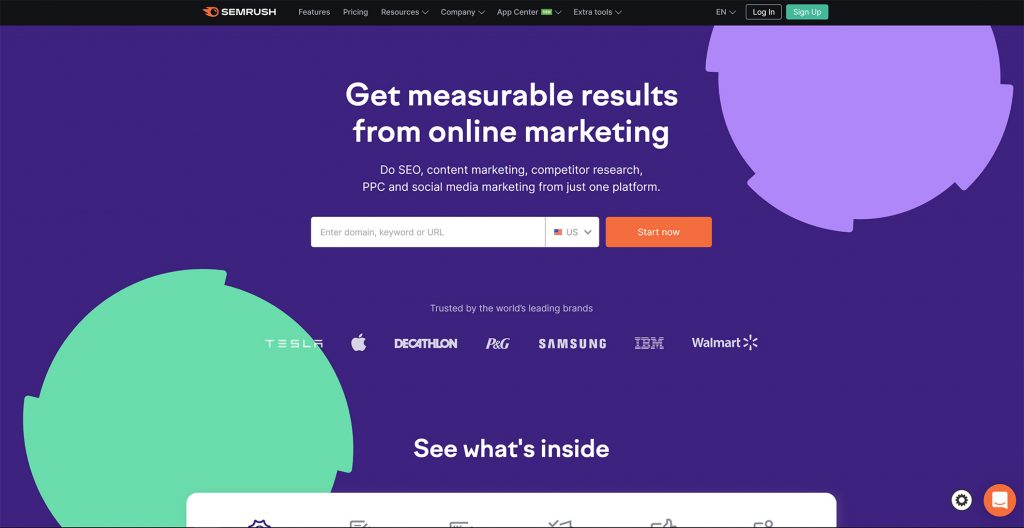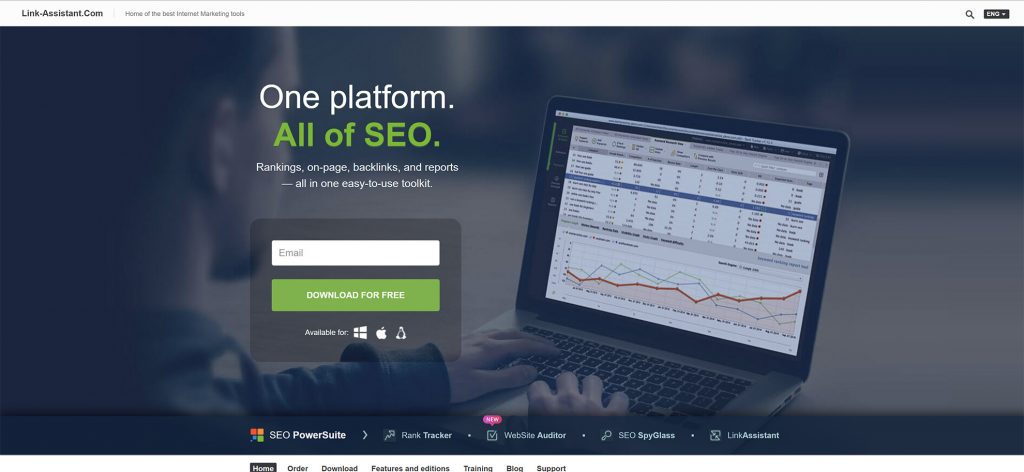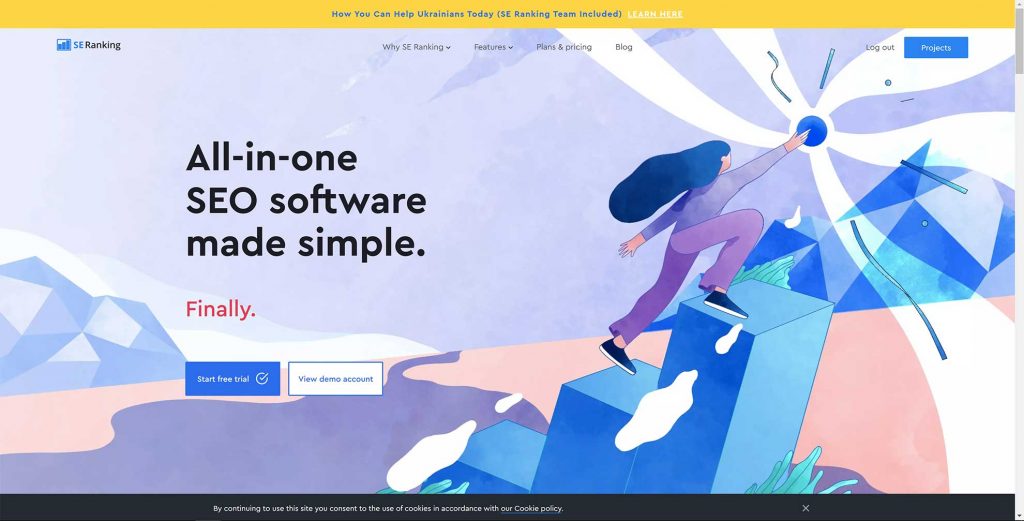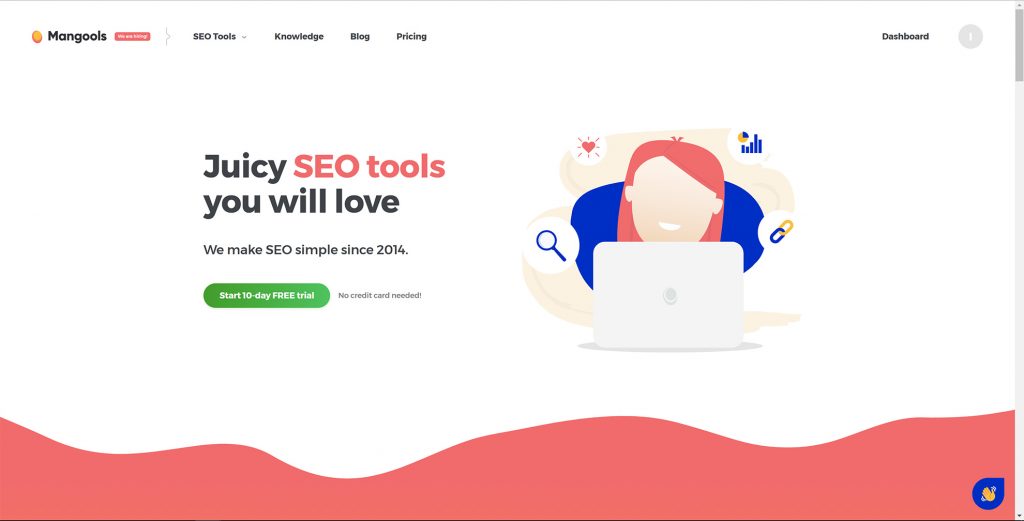Whether you’re an affiliate entrepreneur or operate a small business website, at one point, you’ll need an SEO tool. SEO platforms can provide you with the insights and data you need to achieve better rankings, find business opportunities, or track your SEO results.
In this article, I’ll go over the best SEO platforms, why I use them, and what I use them for. This article will give you the information you need to choose the best tool for your business. As usual, I will only list those I use for my projects.
Quick Summary – Best SEO platforms
- SEMrush – Overall best all-in-one digital marketing suite
- SEO Powersuite – Versatile, feature-rich SEO Software, and SEMrush alternative
- SE Ranking – Great for those on a budget, and are looking for a good SEMrush alternative
- Mangools SEO tools – A user-friendly, yet complete SEO platform. Great for beginners and bloggers
Use the links below to jump to information about the specific platform directly.
What are SEO Tools?
SEO Tools and services that help digital marketers, as well as anyone who creates content, conduct keyword research, analyze the competition, and optimize their content for better rankings. Usually, these digital marketing platforms offer several features, such as keyword research, a backlink analysis, and a Rank Tracker – just to name a few.
Why do you need an SEO Platform?
If you want to compete for organic traffic and outperform your competitors in the search engines, you need to build an effective strategy. Using the platform that’s right for your business needs will help you save time and take the guesswork out of your digital marketing activities. To become successful online, decisions based on data need to be made.
Digital marketers and content creators of any type use these platforms for the following activities:
- Keyword research – Getting keyword suggestions, finding keyword opportunities, keyword difficulty scores, and monthly search volume, and digging for long tail keywords.
- Niche Research – How to find a profitable niche or business idea. Insights for building an effective optimization strategy. Uncovering new content ideas and link opportunities.
- Competitive Analysis – Reverse engineering the competitor’s marketing strategy
- Actionable insights on what’s needed to rank your web pages and outperform the competition
- SEO and content audit –Identify and fix on-page and technical issues like broken links, internal and external link structure, page speed issues, or duplicate content.
- Rank tracking – Monitoring your keyword positions and those of your competition in the search results.
- Reporting – Generate and share a detailed report or website audit report for yourself or your clients
Below is a list of the SEO tools I’ve used and I recommend. If you have any questions related to any of these platforms, don’t hesitate to contact me.
1. SEMrush – All-in-One SEO Platform

SEMrush is an all-in-one digital marketing suite that offers tools for SEO, Content marketing, PPC advertising, and market research. It’s the go-to SEO tool for many digital marketing professionals because of its data quality and many useful insights. SEMrush offers several tools for SEO, content marketing, Market Research, PPC research (advertising), and social media research.
Key Features (SEMrush)
- SEO research – Keyword Research (keyword magic tool), On-page SEO audits, Local SEO optimization, Rank tracking, Link-building analysis.
- Content Marketing – Content Optimization (recommendations)
- Market Research – Competitor Analysis (reverse engineer competitor strategies), Market Analysis (research your current position in the market), PPC research (uncover competitors’ advertisement strategies), Social mentioning monitoring (keep track of what’s said about your competitors)
- Advertising / PPC research – Get insights into your competitor’s PPC (Google Ads) campaigns and the keywords they’re using to trigger their ads.
What I like about SEMrush
- You get an immense amount of data
- SEMrush is the go-to SEO tool for most digital marketing professionals
- Great for both SEO (organic traffic) and PPC (paid traffic) research
- Connect Google Analytics and Google Search Console to and analyze all the data from within SEMrush. This saves you some screen switching within the context of your campaigns.
SEMrush Pricing
It’s not the cheapest tool on the market, but you get what you pay for. If you’re looking to get the best bang for your buck, then SEMrush can be worth the price. The quality and sheer amount of data make up for the price.
Verdict
SEMrush is the best all-around SEO tool on the market. The platform offers everything you need to research your market (niche) and get the competitive insights needed for building effective strategies. SEMrush is great for both SEO-related and PPC (advertising) research. Though SEMrush can have a slight learning curve, the amount of tutorials and learning material available in the free SEMrush Academy makes it a one-stop solution for any serious professional as well as beginner.
SEMrush is a good choice:
- For competitive intelligence – both SEO and PPC research
- Intermediate users and professionals (SEO experts, PPC experts, serious bloggers, content creators, etc.
2. SEO Powersuite – SEMrush Alternative

SEO Powersuite is a one-stop SEO toolbox. The tools are downloadable and can be installed on your hard disk. SEO Powersuite is not an online (SaaS) service. Paying customers can enter their license keys to get full access to powerful features that are restricted in the free version.
Key Features (SEO Powersuite):
SEO Powersuite consists of the following tools:
- Rank Tracker – Keyword research and keyword position tracking software
- Website Auditor – A website and content auditing tool that offers insights for content optimization and fixing errors
- SEO Spyglass – Backlink research tool for finding, analyzing, and comparing your own and competitors’ backlinks
- LinkAssistant – Link-building assistant. It crawls the web to find you the best potential partners for link-exchanging
What I like about SEO Powersuite
- Great metrics for competitive analysis, such as keyword difficulty (KD) and Keyword Efficiency Index (KEI). SEO Powersuite also offers domain InLink Rank, which is very similar to Google PageRank
- Connect Google Analytics (GA) and Google Search Console (GCS) to Rank Tracker. This allows you to view that data inside of SEO Powersuite, which can be very handy for insights.
- Connect Google Keyword Planner (GKP) to Rank Tracker and import keyword data, including monthly search volumes for keyword research
- Most features are not throttled. Monitor the position of as many keywords as you like in Rank Tracker or audit as many pages as needed in the Website Auditor.
- In my opinion, SEO Powersuite’s Rank Tracker is the best SEO tracker for monitoring your rankings
- Keyword list and Topical management – SEO Powersuite offers a great way of organizing your keywords into folders (which you can define as topics). This is a great way of creating a clear picture of your niche as well as building out your strategies over time.
SEO Powersuite Pricing
The SEO suite comes in three flavors, namely: the ‘free version’, the ‘professional edition’, and the ‘enterprise edition’. The free version is not usable, so I don’t recommend it, except for playing around. The reason is that the free version doesn’t allow you to save projects. The real power is unlocked in the paid versions and enables features like saving projects and connecting Google Analytics, Google Search Console, and Google Keyword Planner accounts.
That said, paid version pricing is very competitive, and if you know how to work with SEO Powersuite, it’s worth the price. I use the SEO Powersuite ‘professional edition’, but larger agencies might want to opt for the more expensive ‘enterprise’ edition, which provides even more features, such as white-labeling SEO reports.
Verdict
For the price, SEO Powersuite offers a lot of value. It has most features you’ll find in more expensive SEO platforms, while doing a great job at everything.
SEO Powersuite is a good choice if you:
- Need to do both SEO and PPC research
- Need to track many keywords. Rank Tracker offers unlimited position tracking since it’s a web crawler
- Need to do many website audits. Website Auditor is easy to use, and fixing on-page and technical SEO issues is easy
- Are on a budget and are not willing to pay for one of the more expensive SEO platforms
- Are you willing to accept switching screens between tools
- You aren’t afraid to spend some time getting to know the platform
- You’re looking for the best SEO tracker (Rank Tracker) on the market.
Note: Read the in-depth SEO Powersuite Review to learn more.
3. SE Ranking – SEO Tools Made Simple

SE Ranking SEO Software positions itself as a one-stop SEO platform solution for entrepreneurs, SMBs, and agencies alike. SE Ranking tries to make SEO simpler by offering tools that are easy to use, yet provide enough data for SEO professionals.
Key Features (SE Ranking)
SE Ranking offers the following Tools:
- Keyword Rank Tracking – Monitor your ranking progress in the search engines
- SEO and PPC competitive research –
- Website Auditing – Fix on-page SEO-related errors to rank higher
- Backlink Analysis – Discover and monitor your own and competitor backlinks and get a clear overview of link profiles
- Keyword Research – Find relevant Keywords and Topics to target in your content
- Keyword Grouping – Helpful for a modern topic-cluster SEO approach
- Page Change Monitoring – Get alerted when something changes on your competitor’s webpage
What I like about SE Ranking
- Easy to use – Clear reports and an uncluttered user experience make SE Ranking a pleasure to use
- Good data. I compared the data to some of my other favorite tools, and the numbers were comparable
- Reasonably priced, starting at the ‘pro‘ plan. Everything below the ‘pro’ plan I wouldn’t recommend, because it’ll be easy to run into the data lookup limit
- Mobile application – Monitor your keyword rankings on the go
- SEO and PPC analysis – Get insights to reverse engineer not only organic traffic strategies but paid traffic tactics as well
SE Ranking Pricing
SERanking is priced well, as long as you buy at least the ‘pro‘ plan. The ‘essential’ plan only allows for 100 keyword research searches per day, while the ‘pro’ immediately jumps to 5000. If you decide to get an SE Ranking subscription, I recommend getting the ‘pro’ plan – unless you only do very light research.
Verdict
SE Ranking is an easy-to-use, yet high-quality platform. The data quality is good, and the reporting is clear. What’s also nice is that it doesn’t take a long time to get used to working with SE Ranking. I recommend SE Ranking to both intermediates and professionals or individuals who are on a budget.
4. Mangools – SEO tools

Mangools SEO Tools provides a collection of tools that are incredibly easy to use, yet offer powerful features. The company is positioning its product for ease of use and an uncomplicated experience.
Key Features (Mangools)
Magnools SEO platform consists of:
- KWfinder – Keyword Research tool
- SERPChecker – Analyze the Google Results and competition for a specific keyword.
- SERPWatcher – Rank Tracking for your keywords
- LinkMinder – Backlink profile analysis
- SiteProfiler – SEO and website metrics in the dashboard layout
What I like about Mangools
- Very easy to use. It’s a matter of jumping in and starting to work. The dashboards and working areas are very uncluttered
- It’s relatively fast. Not much lag, and working with Mangools tools is a smooth experience
- They claim to have the most accurate KD (keyword difficulty) metric and search volumes
- It may have fewer features than other SEO tools on the market, but everything you need is there
- Mangools uses TF (trust flow) and CF (citation flow) metrics. These are imported from Majestic SEO
Mangools Pricing
Pricing is good for what you get. Mangools is a solid platform, and the simplicity of using the suite is unmatched. I would not recommend the cheapest plan (100 keyword lookups is just not much), however, the Premium plan offers 500 lookups a day, which is pretty good.
Verdict
Mangools is an affordable yet complete suite of SEO tools. It’s very easy to use,and I would recommend this product to beginners, but also to professionals.
Mangools SEO Tools are a good choice when:
- Are you a beginner and want to jump in right away
- Are on a budget, but need the most important SEO tool features
Conclusion
So, what’s the best SEO tool for your business? Most of the tools listed above offer similar capabilities – yet they are not created equal.
- For the best of the best, in terms of SEO tools, I recommend using SEMrush.
- If you want power, on a budget, choose SEO Powersuite.
- For something in between the two above, try out SE Ranking.
- If you’re a beginner, I would go for Mangools.
FAQ (Frequently Asked Questions)
Below are some frequently asked questions regarding SEO in general and SEO tools. Handy for those who are new to SEO, content marketing, and the tools listed in this article.
How to choose an SEO tool
There are several things to be aware of when you’re looking for an SEO tool. The most important thing is to evaluate your needs. How many pages does your website have? How much content do you need to optimize? How many keywords do you need to track? Are you an SEO expert or a beginner? Some tools fit all situations.
Below is a list of my best SEO software recommendations. I’ve included services that are suitable not only for professionals but also for beginners.
How accurate are monthly Search Volumes?
Most SEO platforms get their keyword search volumes from Google Keyword Planner. Google’s data, however, is originally intended for Google Ads advertisers (not for SEO). Because of these SEO tools, they combine this data with other sources to be able to make an estimated guess of the monthly search volumes.
This is the reason why keyword search volumes differ so much across various SEO platforms. So what does this all mean? Monthly search volumes are an estimation and shouldn’t be taken literally. Use them to get a rough idea of the number of monthly searches, and never plan your content marketing strategy around search volume only.
What is SERP analysis?
SERP analysis is the activity of researching the Google results page for a given keyword phrase and analyzing what it is that makes your competitors rank in a specific position. Another part of SERP analysis is estimating what is deemed relevant content from the search engine’s perspective and what it will take to outrank the competition.
What’s the difference between keyword research tools and SEO platforms
Keyword tools are usually part of an all-in-one digital marketing platform. Years ago, SEO tools were just keyword research tools. However, they’ve evolved into full-fledged SEO or Digital Marketing suites. Besides keyword tools, they now usually offer link analysis, rank tracking, and competitive intelligence features.
Should I optimize for search engines like Bing?
Bing and Google have different user bases. People using Bing are usually older (of age) than Google users. Bing’s user base is also much smaller. If you optimize your content for Google, you’re most likely also optimizing for search engines like Bing and Yahoo. I don’t worry about any other search engines except Google.
What is keyword difficulty?
A metric that’s calculated in SEO or keyword research tools indicates how difficult (or how much work) it will be to rank on the first page of Google, for that particular keyword phrase. Different tools have different ways of calculating KD, and the numbers between tools are drastically different. KD is important, but should never be taken as the absolute truth.
What is domain authority?
A metric calculated to give an impression of the ‘authority’ a website (or domain) has. Authority is built over time, partly by collecting a large number of backlinks and publishing original high-quality content. The more authority, the more ‘important’ the website (or domain) is, from the perspective of the search engine. Higher domain authority can lead to better organic rankings.
What is Rank Tracker software?
A-Rank Tracker or position tracking feature allows the monitoring of your content in the search engine results over time. After optimizing your content, these tools will allow you to track your progress. Depending on your results, you might want to act by re-optimizing your content or collecting more backlinks.
Can you trust monthly search volumes and other data?
SEO tools have different ways of collecting data about things like monthly search volume, estimated website traffic, number of backlinks pointing to a page, etc. Generally, they use their crawlers (robots) for collecting data and combine that data with clickstream data. The latter is data collected from third parties, for example, popular plugins for web browsers.
Data is then passed through complicated algorithms, after which the data is shown in the reports. Making the data as accurate as possible, complications, such as monthly search volume, as well as most other metrics, are ‘accurate estimations’. Depending on the quality of the tool you are using, you’ll get better data.
Can you do effective SEO on your own?
SEO is a process, and it takes time. Building an SEO or content strategy that’s based on quality insights can speed up the process. Generally, digital marketers will hire a team of writers to create as much optimized content as possible. The more content is published, the quicker you’ll see results.
Because of this, it has been difficult for bloggers and small content creators to compete. This is where AI Writing Software and AI SEO tools can help. These tools help non SEO specialists to simplify the content creation and SEO workflow, thus making it easier to optimize for the search engines.
